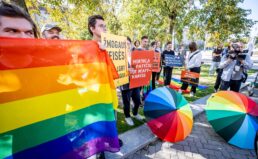Eight US states still have laws restricting teachers and staff from talking about LGBTI issues in school.
Public schools in the United States are ‘inadequate’ when it comes to protecting and educating LGBTI youth, according to a new report.
The report, released by the Human Rights Watch, outlines key areas of opportunity for public schools to make LGBTI youth feel more included.
As it currently stands, only 19 US states have anti-bullying laws in public schools and eight states enforcing No Promo Homo laws, meaning there is a blanket ban on talking about LGBTI issues in the classroom.
Schools in Arizona, for example, ban teaching safe methods of homosexual sex and Alabama must teach that ‘homosexuality is not a lifestyle acceptable to the general public’
This has an inevitable effect on how open students can be with teachers and how receptive teachers are to the information.
The reports states: ‘As transgender and gender non-conforming students have become more visible, too, many states and school districts have ignored their needs and failed to ensure they enjoy the same academic and extracurricular benefits as their non-transgender peers.’
The report reveals that this can produce a breeding ground for intolerance in school hallways.
Openly-gay high school student, Joshua Greer, said: ‘No Promo Homo does affect how they deal with bullying in the classroom…’
‘Just because they think that they can’t even talk about it in school,’ he says in a Human Rights Watch video.
Because many school districts do not instruct their teachers as to what the No Promo Homo laws stipulate, many teachers simply avoid LGBTI issues entirely.
One anonymous respondent of the report is a teacher at a public school in Alabama who revealed that when she tried to start a gay-straight alliance group at the school, parents went to the school board to try to get her fired.
The report concludes that anti-LGBTI sentiment in US public schools is divisive and uneven state-by-state.
‘This undermines a number of fundamental human rights, including LGBT students’ rights to education, personal security, freedom from discrimination, access to information, free expression, association and privacy,’ the report states.




